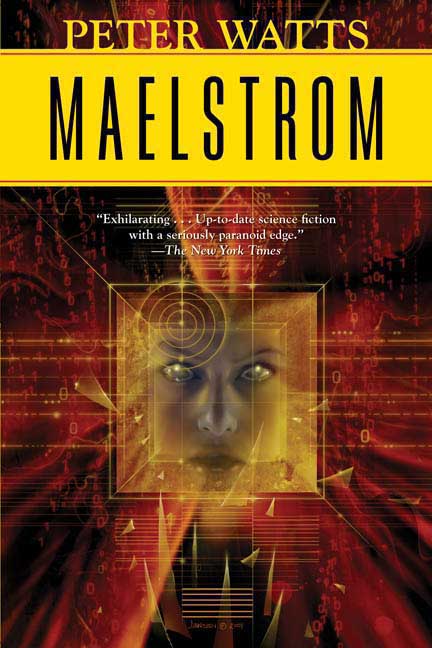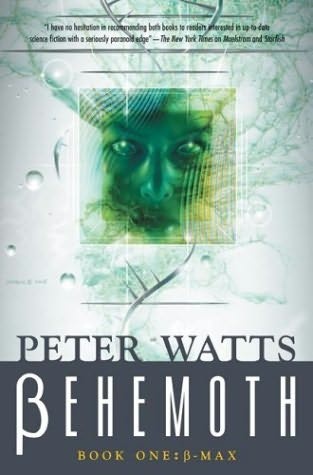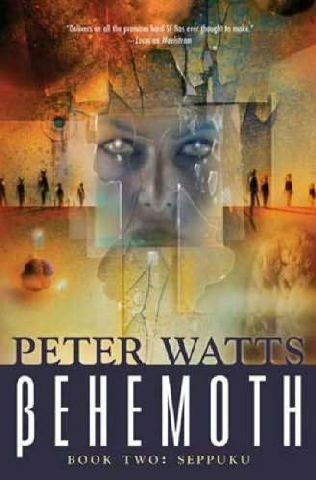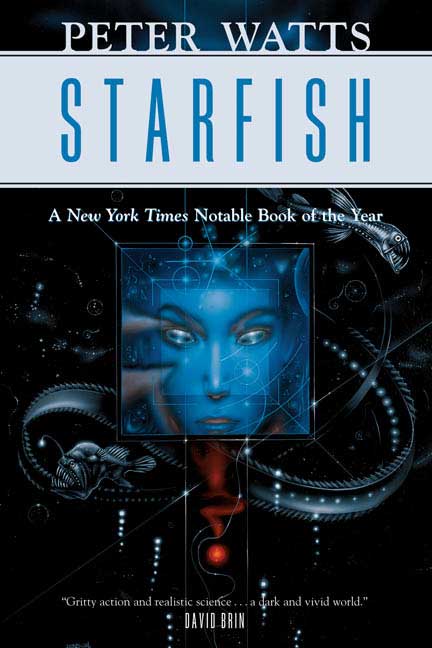When you are sitting in a pressurized platform at the bottom of the ocean, you are psychologically vulnerable. I’m not talking some continental shelf here; I’m not even talking the “regular” incredibly black depths of the deep sea. I’m talking a tin can at the bottom of a trench, I’m talking the crushing doom of a rift. You might as well be in outer space for all the good it’ll do you. The claustrophobia, the dark, the sheer weight of miles of water on top of you…it is enough to make you crazy. It is just a very traumatic situation for a human being to be in, by its very nature.
Or not “nature”—sitting at the bottom of the sea is unnatural. If you are a nihilistic civilization in the bleak dystopian world of Peter Watts’ Rifters Trilogy, the solution to the problem is almost impossibly grim: just select “pre-adapted” individuals for your crew. “Pre-adapted” being a euphemism for…abuse survivors. Take them, give them cybernetic and biological adaptations for deep sea survival, and send them down. There is no way that can go wrong, right?
When I say “abuse survivors,” I mean post-traumatic stress disorder sufferers and healing victims, sure, but also the products of assault, cruelty, neglect; violent offenders and pedophiles, for instance. That should give you an idea how grim these books are; the entire cast of characters are people trapped in cycles of abuse. Interpersonal reactions throughout the book follow the pattern of mounting tensions, sudden lashing out, reconciliation, calm, mounting tension…it repeats through the story until you the reader are desperate for someone or something to break the sequence. These are the characters available to us, sent down under mountains of dark water to work at a geothermal energy plant. Spooky.
 Watts has a marine biology background, and it shows in his work, even in the weirder, more speculative areas. Especially there; the geothermal vent that is the center of the action in the first book, Starfish, is teaming with strange life, with things like deep sea anglers but hundred, thousands of times bigger, tube worms the size of small buildings, Volkswagen sized armored arthropods with strange body configurations. The whole place is just crawling—literally, crawling—with sea monsters. The secret to all this outrageous biology is central to the story, but to the cash-hungry authorities that send the crew of psychologically compromised characters down there couldn’t care less. They are here to run a power plant. Everything else is incidental.
Watts has a marine biology background, and it shows in his work, even in the weirder, more speculative areas. Especially there; the geothermal vent that is the center of the action in the first book, Starfish, is teaming with strange life, with things like deep sea anglers but hundred, thousands of times bigger, tube worms the size of small buildings, Volkswagen sized armored arthropods with strange body configurations. The whole place is just crawling—literally, crawling—with sea monsters. The secret to all this outrageous biology is central to the story, but to the cash-hungry authorities that send the crew of psychologically compromised characters down there couldn’t care less. They are here to run a power plant. Everything else is incidental.
If anything, Peter Watts’ Rifters Trilogy most reminds me of the roleplaying game Blue Planet. That shouldn’t come as a surprise: Blue Planet was a Hard SF setting created by a marine specialists, as well—I remember seeing that the one of the authors had written a textbook and used the pacific (and possible Pacific) picture on the cover for one of the game sourcebooks as well, but with photoshopped science-fiction structures on the islands. Similarly, the books of the Rifter’s Trilogy comes complete with citations and an annotated afterward explaining some of the science that Watts used when writing the saga. That he knows what he’s talking about is never in doubt.
 The speculative science doesn’t stop with the local fauna. The people living in the base have been extensively adapted to deep sea living. We aren’t talking pressure tanks and submersibles, here. The “rifters” have one of their lungs removed and replaced with a highly efficient gill…with the vent being essentially an opening in their chest. They just pop the seal, let their other lung collapse, and then go swimming, letting the sea water in. Since it is as pressurized as the sea water outside their body, they’re free to move about without being crushed horrifically, sort of like how Ed Harris’ character in The Abyss uses a liquid breathing apparatus to go down to the bottom of a rift…except for the rifters, the liquid is good old fashioned H2O.
The speculative science doesn’t stop with the local fauna. The people living in the base have been extensively adapted to deep sea living. We aren’t talking pressure tanks and submersibles, here. The “rifters” have one of their lungs removed and replaced with a highly efficient gill…with the vent being essentially an opening in their chest. They just pop the seal, let their other lung collapse, and then go swimming, letting the sea water in. Since it is as pressurized as the sea water outside their body, they’re free to move about without being crushed horrifically, sort of like how Ed Harris’ character in The Abyss uses a liquid breathing apparatus to go down to the bottom of a rift…except for the rifters, the liquid is good old fashioned H2O.
The eyecaps the rifters wear are essentially night vision contacts, that cover the whole eye, iris and sclera, amplifying any ambient light. Of course, since our cast and crew aren’t exactly what you’d call “balanced,” they end up wearing them all the time. They could take them out, but why bother? With them in, no one can see your eyes. The other tweak is the adjustment to their brain; a neural inhibitor to keep it from going haywire, from physically short-circuiting from the weight of the water. Once the crew start fiddling with those settings, things really start getting weird. After all, why turn the lights on, if you’ve got your caps in? For that matter, why bother coming back inside when you might as well sleep out in the safety of the water. Sure, there are the beasties, but they are far less awful then the people you are with. Hey, now that your brain is firing faster and faster, well, the web of relationships starts getting…almost pack-like, as people start guessing each other’s actions before they happen, like twins finishing each other’s sentences. Pack-like? Well, maybe pod-like. School-like.
 In the end, the monster was inside of us all along. That isn’t a twist, but the premise of the first book. Humans are the worst sea monster of them all. Or…are they? Don’t forget about βehemoth. I won’t spoil any of the surprise, but I will say that the second book, Maelstrom, goes in an entirely different direction. It seems like cheating, to just tell you about βehemoth. I’ll just say that βehemoth is one of the worst possible doomsday scenarios I’ve read about. If anything, the second novel is a little more cyberpunk than the first, but both are almost unrelentingly dark. Not clumsily so; they aren’t gritty for juvenile shock factor, but they are…brutal. These are books about monsters, but not in a creature feature or slasher flick way. The question at the core of the book is—what is scarier than a futuristic dystopia? What is more frightening than being stuck at the bottom of the ocean? What is worse than being trapped with a group of violent repeat offenders? Why is the phrase “checkers, or chess?” so ominous? The answer is…βehemoth.
In the end, the monster was inside of us all along. That isn’t a twist, but the premise of the first book. Humans are the worst sea monster of them all. Or…are they? Don’t forget about βehemoth. I won’t spoil any of the surprise, but I will say that the second book, Maelstrom, goes in an entirely different direction. It seems like cheating, to just tell you about βehemoth. I’ll just say that βehemoth is one of the worst possible doomsday scenarios I’ve read about. If anything, the second novel is a little more cyberpunk than the first, but both are almost unrelentingly dark. Not clumsily so; they aren’t gritty for juvenile shock factor, but they are…brutal. These are books about monsters, but not in a creature feature or slasher flick way. The question at the core of the book is—what is scarier than a futuristic dystopia? What is more frightening than being stuck at the bottom of the ocean? What is worse than being trapped with a group of violent repeat offenders? Why is the phrase “checkers, or chess?” so ominous? The answer is…βehemoth.
Mordicai Knode has always had a soft spot for The Abyss, and in elementary school he wrote a book speculating that the Loch Ness Monster was a family of plesiosaurs living in the secret caves connecting all the Scottish Lochs together. It was cute. He’s also cute on Twitter & on Tumblr.
Disclaimer: Mordicai Knode is a Macmillan employee.











You know the part in Aliens where they say “nuke it from orbit, it’s the only way to be sure? Let’s just say that even then, I wouldn’t be sure.
Sounds very interesting. Somehow, I need to find the time to read these!
2. Stefan
Despite the…grimdark nature of the series, it is actually quite the page turner.
I used to have a backlog of 104 books in my TBR piles. Now it’s 107. Thanks…
Long, long ago, I picked up the first one for a school project and I’ve never looked back. Brilliant, terrifying, and has engendered a life-long fear of starfish.
I’ve read the first one (and just got the second) but it baffles me why Behemoth B-Max is $30ish. Did it never make it to paperback? Even so…
4. Magentawolf
You’ve got to admit, that is the best kind of bad news, though…”oh, ugh more books to read!” Similarly, the other day I mentioned I had to buy more dice to play Fiasco…oh no! More shiny dice!
5. BrightLance
For me it really is ?ehemoth. Whether or not I buy the science, the science is totally plausible, & it is one of those things that would render a whole species…impotent. I think sometimes about setting it loose on my RPG campaign, but that is perhaps too, too mean. Oh! Crud, I just had a good idea…
6. corig123
I don’t actually know the entire ins & outs of its publication history; I will note that there is a free version on the author’s site.
One of the darkest, meanest trilogies ever written. Twisted psychlogies… terrible things happening to the entire biosphere… it’s all very… russian. At one point Watts even uses a literary device I remember from a Chekov story. But somehow, it’s not exactly depressing. Dark, yes, but in a very cool, cynical way that takes a bit of the sting off the horibleness.
Oh, and they’re all available, legally, as free downloads on the author’s website.
Free you say? Generally I like to have the physical thing, even if just to sit on the shelf and look pretty, but… hard to argue with free!
I read STARFISH when it came out and though it was well written, it was way too depressing to want to spend any more time in that world with those people. I later on read BLINDSIGHT and diecided the same thing – imaginative SF author with people I did not like and a depressed outlook on life that disturbed me too much. I guess all writers are not for everyone.
Bob@10:
Just wanted to add that http://rifters.com/ Watts’ own homepage has the below quote. Me, I really like his stuff.
“Whenever I find my will to live becoming too strong, I read Peter Watts.” —James Nicoll
Just started the free version of Behemoth. Pretty good! I only knew of Watts before for his short story The Things.
10. Bob
Oh see, I think Blindsight is even better! I feel you though, I’m usually the same way– but sometimes it just clicks, like here. Or Oz.
Damn, I love Peter Watts. But I only read Starfish and Maelstrom. And Blindsight. And some of his short stories. And his blog posts about his battle against flesh-eating bacteria. Jesus. He wrote almost all of his books before his body started cannibalizing itself and they were still that dark. Egads.
I’ve got to get on re-reading these books, and reading Behemoth for this first time. When my will to live is becoming too strong. Blindsight was extremely unpleasant, uncomfortable, disturbing and astounding.
Re: Behemoth. I think I remember something about the manuscript coming in way too long so it was split into two parts, B-Max and Seppuku, and that’s why I never got around to it. If it was just one book, I probably would’ve started it because it seemed less daunting.
14. theresa_delucci
Not to mention his border skirmish, as well. He’s had a rough time of it.
Phenomenally excellent review, Mordicai. I have already read the novels, but your review makes the books sound so good for them to be worth a second go-round.
And of course they are. Any book by Peter Watts is worth the re-read; now past the breathless excitement of the story, you can sit down and dig deeper into his sub-text.
Purportedly, a sequel / prequel / complement (?) to Blindsight is coming soon. Perhaps someone could offer more info about that book.
Meanwhile, I look forward to your next post.
Peter Watts gets my vote for best SF writer of the 21st century. He’s just brilliant — not comfortable, not cosy — keen edge brilliant, stylish, and challenging. And, somehow, damned funny.
@16
Yes, a companion to Blindsight is allegedly coming in late 2013. Gives me plenty of time to re-read Blindsight.